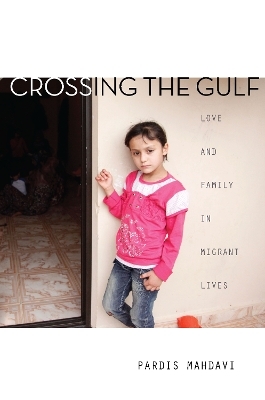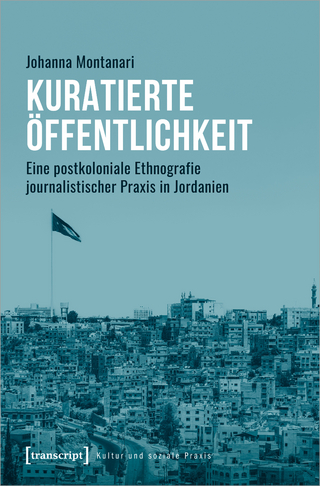
Crossing the Gulf
Stanford University Press (Verlag)
978-0-8047-9442-8 (ISBN)
- Lieferbar (Termin unbekannt)
- Versandkostenfrei
- Auch auf Rechnung
- Artikel merken
The lines between what constitutes migration and what constitutes human trafficking are messy at best. State policies rarely acknowledge the lived experiences of migrants, and too often the laws and policies meant to protect individuals ultimately increase the challenges faced by migrants and their kin. In some cases, the laws themselves lead to illegality or statelessness, particularly for migrant mothers and their children.
Crossing the Gulf tells the stories of the intimate lives of migrants in the Gulf cities of Dubai, Abu Dhabi, and Kuwait City. Pardis Mahdavi reveals the interconnections between migration and emotion, between family and state policy, and shows how migrants can be both mobilized and immobilized by their family relationships and the bonds of love they share across borders. The result is an absorbing and literally moving ethnography that illuminates the mutually reinforcing and constitutive forces that impact the lives of migrants and their loved ones—and how profoundly migrants are underserved by policies that more often lead to their illegality, statelessness, deportation, detention, and abuse than to their aid.
Pardis Mahdavi is Associate Professor and Chair of Anthropology at Pomona College. She is the author of Passionate Uprisings: Iran's Sexual Revolution (Stanford, 2008) and Gridlock: Labor, Migration, and Human Trafficking in Dubai (Stanford, 2011). She has been a Woodrow Wilson Center Fellow and a Google Ideas Fellow.
Contents and Abstracts1Im/mobilities and Im/Migrations chapter abstractThe opening chapter provides the theoretical framework of the book. It introduces the concept of "intimate im/mobilities" and explores the alternative frameworks of im/mobility and im/migration. This chapter presents the book's three main interconnected arguments. First, that migration is impacted by individuals' intimate lives and vice versa. Second, through narrating the intimate lives of laborers, the book explores the mutually constitutive forces of mobility and immobility. Finally, in looking at the mutually re-enforcing notions of im/mobility, the book explores the liminal space between immigration and migration. This chapter lays out these main arguments/framings to introduce the core themes that will be fleshed out through the individual chapters. It also provides a brief methodological and historical background to help set the stage for the ethnographic chapters to follow.
2Love, Labor and the Law chapter abstractThis chapter looks at the confluence of love, labor and the law by focusing on the regulation of migrant women's sexualities while they are in the Gulf. Migrant women increasingly comprise the majority of migrants to the region as the demand for intimate labor in the Gulf is on the rise. But migrant women who become pregnant while in the Gulf are immediately imprisoned and charged with the crime of zina, thereby immobilizing them and halting their family lives. These women give birth while incarcerated and spend up to a year with their babies in prison. Many are then forcibly separated from their children when they are deported, rendering the children stateless in the host country. Some migrant women have recently been protesting these laws by refusing and fighting deportation without their children. This chapter contrasts discourse and legal analysis with the lived experiences of migrant women and their children.
3Inflexible Citizenship and Flexible Practices chapter abstractChapter 3 focuses on the effects of migration on the intimate lives of migrants and their kin. It looks at the children of migrants, many of whom have either migrated to work or re-unify with parents abroad, while others were born in the host country. These families are struggling to define and re-define their understandings of family, citizenship, and belonging across borders. Building on the work of several migration scholars, the author examines how intimate lives are shaped by migration in the particular context of the UAE and Kuwait. The chapter explores the challenges migrants and their kin face in the form of inflexible citizenship, as well as the flexibility they employ to create types of mobility within the context of apparent immobility.
4Changing Home/s chapter abstractThe migrants whose stories are introduced in this chapter chose to migrate in search of a type of intimate mobility that they could not find at home. They also migrate in search of economic prosperity and upward class mobility; however, social reasons are at the top of their migratory decision-making factors. Specifically, these young women and men describe wanting to migrate not out of poverty, and not out of a desire to support their families, but out of their families and communities altogether. This aspect of migration is an example of intimate mobilities that puts into play the relationship between mobility and immobility in the intimate lives of im/migrants whose migratory journeys take them in search of a new "home." Attention to the complex decision making processes helps to describe the role of migration in encouraging the exploration of subjectivity for many individuals.
5Children of the Emir: chapter abstractChapter 5 introduces the many children of migrant women and men who have been separated from their parents. Some of these children have been born in host countries to trafficked women and have become stateless. Others are children who were born to migrant women and spend their lives as non-citizens in the host countries. Still others are children who are separated from their parents when their parents migrate, while the children stay home and are raised by other relatives. The experiences of these children as they encounter the state reveal the biopolitical undertones of laws and regulations implemented to govern their lives. Two interconnected theoretical lenses prove useful: theories about perverse integration and theories about legal productions of illegality, which, together lead to a concept of "perverse intimacies."
6Transformations and Mobilizations chapter abstractChapter 6 draws on ethnographic fieldwork with migrants and state officials charting changes in state policies that have come from migrant-state encounters. The chapter is focused on stories of migrant activism both at home and abroad, and details the ways in which they have drawn from their own intimate lives to make changes in state and global policies. Various intimate interactions between migrants and personifications of the state are highlighted to complicate the perceived oppositional binary of migrants vs. the state.
7Negotiated Intimacies and Unwanted Gifts chapter abstractThis concluding chapter emphasizes the creative ways that migrants and their families have navigated the many challenges they face, often drawing from their own intimate lives. The chapter focuses on the transformative effects of migrants on the state to argue against trafficking as a framework, discourse, and set of policies. Trafficking as a framework is deconstructed and, instead, a framing of "safe migration" is proposed.
| Erscheinungsdatum | 30.04.2016 |
|---|---|
| Verlagsort | Palo Alto |
| Sprache | englisch |
| Maße | 152 x 229 mm |
| Themenwelt | Sozialwissenschaften ► Ethnologie ► Völkerkunde (Naturvölker) |
| Sozialwissenschaften ► Soziologie | |
| ISBN-10 | 0-8047-9442-1 / 0804794421 |
| ISBN-13 | 978-0-8047-9442-8 / 9780804794428 |
| Zustand | Neuware |
| Informationen gemäß Produktsicherheitsverordnung (GPSR) | |
| Haben Sie eine Frage zum Produkt? |
aus dem Bereich


